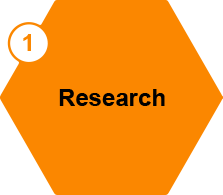
A cross-platform weight loss app for people who have trouble reducing weight owing to hormonal and menstrual influences. It aims to facilitate healthy and scientific weight loss through the proven concepts of hormone tracking, menstruation tracking, calorie tracking, and medical expert support.

Researcher, UX/UI Designer

iOS, watchOS
The current weight management industry has focused primarily on food facts, single-mode diet recipes, and meal subscriptions for all groups. However, existing solutions fail to address holistic and systematic planning, including diet, exercise, and hormones, for women who need to lose weight.





There has been a growing demand for weight loss services in the world. The global Weight Loss Services market size is projected to reach US$ 15130 million by 2028, from US$ 10600 million in 2022, at a CAGR of 5.2% during 2022-2028. In addition, 30.0% of the world’s population is either obese or overweight, according to the Institute of Health Metrics and Evaluation. Obesity poses an enormous challenge for developed countries and lower & middle-income countries.

Women typically find it harder to lose weight due to the fact that they have less lean muscle mass and a lower resting metabolic rate. Another issue that makes weight loss challenging for women: women store fat differently from men--more of it goes to their thighs, buttocks, and hips, where it can be harder to shed. Women's weight loss is usually accompanied by a hormonal imbalance that makes weight loss more difficult and causes menstrual irregularity.

I analyzed several comparable weight loss platforms available in 2022 to gain insights into their features, user experience, and feelings evoked by the design solutions.

The current weight management industry has focused primarily on food facts, single-mode diet recipes, and meal subscriptions for all groups. However, existing solutions fail to address holistic and systematic planning, including diet, exercise, and hormones, for women who need to lose weight. In addition, the current platforms are not user-friendly and inaccessible, which is hard for users to navigate for good information.
People who have trouble reducing weight owing to hormonal and menstrual influences — primarily women, followed by those who also menstruate
This phase started with generating ideas and solutions for each platform of the upcoming product.

Femenu is inspiring people all around the world to lose weight. It is the most effective, individualized, mobile-based weight loss programme for people who have trouble reducing weight owing to hormonal and menstrual influences. To facilitate healthy, scientific weight loss, Femenu was founded on the proven concepts of hormone tracking, menstruation tracking, calorie tracking, and medical expert support.
Femenu app can automatically predict the length of members' cycle and their period based on their history, diet, health conditions and personal information. On top of the tracking period, Femenu can track members' moods and symptoms. By doing this, the app can accurately pinpoint trends or patterns specific to members' bodies, like diet patterns, nutrition intake, calorie budget, and food to avoid. Then, recommend suitable meal plans, recipes, and even food in a restaurant if they eat out.
View Prototype >>
Femenu extends its carry of features beyond the standard experience. It builds a wearable app for Apple Watch OS, which provides a simple and intuitive task-oriented cooking guide with engaging images and animations that are easy to understand and follow. In addition, the wearable app enables users to sync their information (data, history, and settings) to their phone without switching between devices, so Femenu can stay well-versed in users' wellness and generate personalized plans precisely.
View Prototype >>

To conceptualize my ideas, I first drafted low fidelity sketches, which were then turned into a medium fidelity prototype

This physical prototype was used to conceptualize the app, helping demonstrate the user flow and functionality that the future design will have in the early stages of ideation. It's a way of dealing with usability problems before I started to work on the high-fidelity prototype.







The biggest takeaway for me from this project is the importance to define the project scope in an early stage. For a complex topic like weight management, there might exist a lot of systematic issues and multiple ways to approach the solution. The key to a successful solution is whether it addresses the core, essential problem in relation to the greater context; or if it is narrowed down enough that it effectively solves a specific pain point for a certain group of users. And this is what this project is falling short of.
You could work on "perfecting" your design forever, but none would be meaningful if you never conduct usability testing on it. I learned to validate my design by usability testing, and to discern what is critical and not working in the product as early as possible. It is important to put away your subjective thinking, and use the result to fuel your design development and decisions. Design is not art.